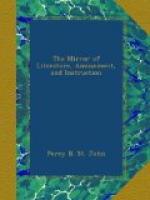There were at Athens various funds, applicable to public purposes; one of which, and among the most considerable, was appropriated for the expensed of sacrifices, processions, festivals, spectacles, and of the theatres. The citizens were admitted to the theatres for some time gratis; but in consequence of the disturbances caused by multitudes crowding to get seats, to introduce order, and as the phrase is, to keep out improper persons, a small sum of money was afterwards demanded for admission. That the poorer classes, however, might not be deprived of their favourite gratification, they received from the treasury, out of this fund, the price of a seat—and thus peace and regularity were secured, and the fund still applied to its original purpose. The money that was taken at the doors, having served as a ticket, was expended, together with that which had not been used in this manner, to maintain the edifice itself, and to pay the manifold charges of the representation.
“DRAMATIC REPRESENTATIONS NATURAL TO MAN.”
Travellers inform us, that savages, even in a very rude state, are found to divert themselves by imitating some common event in life: but it is not necessary to leave our own quiet homes to satisfy ourselves, that dramatic representations are natural to man. All children delight in mimicking action; many of their amusements consist in such performances, and are in every sense plays. It is curious, indeed, to observe at how early an age the young of the most imitative animal, man, begin to copy the actions of others; how soon the infant displays its intimate conviction of the great truth, that “all the world’s a Stage.” The baby does not imitate those acts only, that are useful and necessary to be learned; but it instinctively mocks useless and unimportant actions and unmeaning sounds, for its amusement, and for the mere pleasure of imitation, and is evidently much delighted when it is successful. The diversions of children are very commonly dramatic. When they are not occupied with their hoops, tops, and balls, or engaged in some artificial game, they amuse themselves in playing at soldiers, in being at school, or at church, in going to market, in receiving company; and they imitate the various employments of life with so much fidelity, that the theatrical critic, who delights in chaste acting, will often find less to censure in his own little servants in the nursery, than in his majesty’s servants in a theatre-royal. When they are somewhat older they dramatize the stories they read; most boys have represented Robin Hood, or one of his merry-men, and every one has enacted the part of Robinson Crusoe, and his man Friday. We have heard of many extraordinary tastes and antipathies; but we never knew an instance of a young person, who was not delighted the first time he visited a theatre. The true enjoyment of life consists in action; and happiness, according to the peripatetic definition, is to be found in energy; it accords, therefore, with the nature and etymology of the drama, which is, in truth, not less natural than agreeable. Its grand divisions correspond, moreover, with those of time; the contemplation of the present is Comedy—mirth for the most part being connected with the present only—and the past and the future are the dominions of the Tragic muse.




